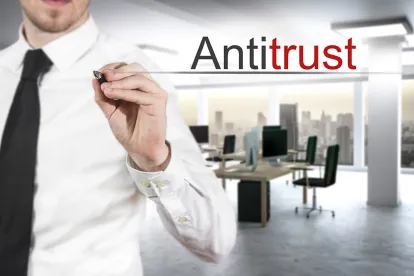United States
Federal Trade Commission (FTC)
-
FTC Approves Final Order Imposing Conditions on AbbVie Inc.’s Acquisition of Allergan plc.
On Sept. 4, 2020, the FTC approved a final order settling its complaint that AbbVie’s $63 billion acquisition of Allergan would violate federal antitrust law. Under the terms of the settlement, AbbVie and Allergan agreed to divest to Nestlé, S.A. Allergan’s Zenpep and Viokase, which are currently sold to treat exocrine pancreatic insufficiency (EPI), and to AstraZeneca plc Allergan’s rights and assets related to brazikumab, an IL-23 inhibitor in development.1 The parties agreed to complete the divestitures within 10 days after completing the acquisition of Hollingsworth, and to maintain the competitiveness of those divestiture assets pending the completion of the ordered divestiture sales.
-
FTC Approves Final Order Requiring Animal Health Product Suppliers Elanco Animal Health, Inc. and Bayer Animal Health GmbH to Divest Assets in Three Product Markets as a Condition of Acquisition.
On Sept. 11, 2020, the FTC approved a final order settling its complaint that animal health products supplier Elanco Animal Health, Inc.’s proposed $7.6 billion acquisition of Bayer Animal Health, Inc. would be anticompetitive. As a condition to closing the acquisition, the final order requires Elanco to divest its canine otitis external treatment, Osurnia, to Dechra Limited; its fast-acting oral treatment that kills adult fleas on dogs, Capstar, to PetIQ, LLC; and its brand name cattle pour-on insecticide, StandGuard, to Neogen Corporation.2 A monitor was also appointed to ensure compliance with the terms of the order. The parties agreed to complete the divestitures within 10 days after completing the acquisition of Hollingsworth, and to maintain the competitiveness of those divestiture assets pending the completion of the ordered divestiture sales.
-
FTC’s Bureau of Economics to Expand Merger Retrospective Program.
On Sept. 17, 2020, the FTC’s Bureau of Economics announced a revamped Merger Retrospective Program, which will expand and formalize the Bureau’s retrospective research efforts that have already produced studies analyzing the effects of a range of consummated mergers over the last 35 years. Merger retrospective analysis seeks to determine, after the fact, whether a merger has affected competition in the way enforcers predict at the time of their review of a proposed combination. The analysis can help the agencies assess their thresholds for bringing an enforcement action in a merger, as well as the veracity of tools used to predict the effects of a proposed merger, such as merger simulation models.
The Merger Retrospective Program will include an annual report on the lessons from recent retrospective studies, specific evaluation of predictive tools, a new website devoted to research on retrospectives that includes a bibliography of retrospective studies, and regularly scheduled major economic conference sessions devoted to recent research under the Program.
-
FTC and DOJ Seek Comments on Proposed Amendments to HSR Rules and Advanced Notice of Proposed HSR Rulemaking.
On Sept. 21, 2020, the FTC, with the support of the Antitrust Division of the Department of Justice (DOJ), published a Notice of Proposed Rulemaking (NPRM) to revise the premerger notification rules (Rules) for mergers and acquisitions under the Hart-Scott-Rodino Antitrust Improvements Act of 1976 (HSR Act). The proposed revisions would create a new reporting exemption for certain de minimis investments of 10% or less of an issuer, but with several important limitations on the proposed exemption, such as when a private equity investor holds an equity interest of 1% or greater in a competitor of the issuer. At the same time, the proposed revisions would also significantly expand the scope of private equity investment transactions that would be subject to HSR Act notification, as well as the information and documents which must be included in a notification under the HSR Act. In the latter case, the proposed revisions would require additional detail with respect to portfolio holdings of private equity funds which are not directly participating in the acquisition, but which are commonly managed within the same “family” as the fund(s) participating in the investment.
Additionally, on the same day, the FTC published an Advance Notice of Proposed Rulemaking (ANPRM) to solicit information on several topics to “help determine the path for potential future amendments” to the Rules. These topics include: how parties must calculate the size of transaction for threshold value; how current filing exemptions are applied to acquisitions by real estate investment trusts (REITs); minority acquisitions of limited partnerships and LLCs (non-corporate entities); minority acquisitions of voting securities; “influence outside the scope of voting securities” such as acquisitions of convertible securities or rights to board observers; the impact on jurisdictional thresholds of issuing extraordinary dividends to shareholders prior to closing a transaction; and other miscellaneous issues pertaining to the HSR filing process, such as exemptions for certain incremental purchases of stock in the same issuer, and the scope of prior acquisitions of an acquirer that must be reported in a notification. Interested parties are invited to submit comments on the NPRM and ANPRM, per the instructions provided therein, no later than sixty (60) calendar days following publication of the NPRM and ANPRM in the Federal Register, which is expected shortly.
See our recent GT Alert for further details on the NPRM and ANPRM and their applicability to various types of investing entities.
B. Department of Justice (DOJ)
-
Antitrust Division Seeks Public Comments on Updating Bank Merger Review Analysis
On Sept. 1, 2020, the DOJ announced that it is seeking public comments as to whether its Antitrust Division should revise the 1995 Bank Merger Competitive Review guidelines (Banking Guidelines) to “reflect emerging trends in the banking and financial services sector and modernize its approach to bank merger review under the antitrust laws.” Competitive review of bank mergers requires both approval by the relevant bank regulatory agency and a competitive review conducted by the DOJ. Historically, bank merger applications are initially reviewed by DOJ based on the Banking Guidelines using market shares, market concentration thresholds, and other market facts and conditions. The DOJ’s review of bank mergers is “independent” from review by the Federal Reserve (and other bank regulators), and “a transaction that meets the Federal Reserve’s HHI delegation threshold still may raise concern in the division’s review.”
The DOJ invites comment from banks, other financial institutions, and industry stakeholders to help it evaluate “whether the division should revise the Banking Guidelines or change the way it analyzes bank mergers to reflect modern trends in financial services and banking competition.” Comments must be received no later than Oct. 16, 2020.
-
Justice Department Issues Modernized Merger Remedies Manual.
On Sept. 3, 2020, the DOJ released an updated Merger Remedies Manual (Manual). This 2020 manual updates the DOJ’s prior 2004 Policy Guide to Merger Remedies.
According to the updated Manual, a divestiture is strongly preferred to a “behavioral” or “conduct” remedy as a means to resolve agency objections to a merger or acquisition because the DOJ strives to avoid ongoing government regulation and monitoring post-close. The Manual states that a conduct remedy may be appropriate to help facilitate a structural remedy, such as in the case of temporary supply agreements to a divestiture buyer, or firewall provisions. Less often the DOJ will approve of standalone conduct relief, and only where merging parties can prove that: “(1) a transaction generates significant efficiencies that cannot be achieved without the merger; (2) a structural remedy is not possible; (3) the conduct remedy will completely cure the anticompetitive harm, and (4) the remedy can be enforced effectively.” Importantly, the Manual clarifies that the DOJ will evaluate strategic and private equity divestiture buyers using the same criteria.
The FTC did not join in this Manual, and it remains to be seen how their approach to merger remedies may differ from the DOJ’s.
-
Justice Department Requires Divestiture in Order for Anheuser-Busch To Acquire Craft Brew Alliance.
On Sept. 18, 2020, the DOJ announced that it is requiring Anheuser-Busch InBev SA/NV (ABI), its wholly-owned subsidiary Anheuser-Busch Companies LLC (AB Companies), and Craft Brew Alliance Inc. (CBA) to divest CBA’s entire Kona brand business in the state of Hawaii to PV Brewing Partners and to license to the acquirer the Kona brand in Hawaii as conditions to AB Companies, a minority shareholder in CBA, acquiring all of the remaining shares of CBA. PV Brewing Partners LLC was formed by VantEdge Partners LP, a private equity company based in metropolitan Kansas City, and is headquartered in Overland Park, KS.
The settlement requires the sale of the Kona brewing facilities in Hawaii, including a new 100,000-barrel capacity brewery currently under construction, and a perpetual, exclusive license of the Kona brand for the brewing, distribution, and sale of Kona beer in Hawaii.
C. U.S. Litigation
-
In re Delta Dental Antitrust Litigation, Civil Action No. 19-CV-6734 (N.D. Ill.)
In 2019, dental service providers filed Section 1 claims against 39 dental service corporations who use the Delta Dental name, together with the Delta Dental Plans Association, Delta Dental Insurance Company and related companies, alleging that the defendants engaged in a multifaceted conspiracy to restrain competition in the dental insurance business. The plaintiffs alleged that the defendants allocated markets, agreed to fix artificially low reimbursement rates, and limit the revenue a plaintiff could derive from selling non-Delta-Dental-branded dental insurance.
In September 2020, the court denied the defendants’ motion to dismiss, saying the industry does not resemble the credit card market on which the U.S. Supreme Court based a landmark antitrust ruling about “two sided” platforms.3 “While there are indeed some similarities between the role credit card companies play in facilitating transactions” and “the role dental insurance companies play in facilitating” care, the defendants “overstate” the decision’s impact and “overreach in their characterization of the dental insurance market as a two-sided transaction platform,” the judge wrote. Here, the district court ruled “dental insurance lacks the ‘key feature’ of a transaction platform: simultaneity of the exchange.” Dental insurance policyholders “typically pay insurers fixed premiums at regular intervals, regardless of when or even whether they visit the dentist,” and their premiums depend on their plan’s “terms and coverage, “not on the cost of the goods or services.” The court also stated that it was unconvinced that the “nuanced analysis” called for in two-sided market cases required it to apply the rule of reason rather than holding the agreements per se illegal.
-
In re Broiler Chicken Antitrust Litigation, Civil Action No. 1:16-cv-08637 (N.D. Ill.)
Since 2016, several classes of purchasers and numerous direct-action plaintiffs have been litigating claims that the major producers of broiler chickens engaged in supply manipulation and price fixing. Earlier in 2020, the DOJ indicted four executives of Pilgrim’s Pride and Claxton Poultry, alleging that these individuals engaged in bid rigging in the market for broiler chickens sold to restaurants and restaurant-chains. In response to those indictments, four new plaintiffs filed complaints that included bid-rigging claims as well as the prior supply manipulation and price-fixing claims. Defendants moved to dismiss the bid-rigging claims from the consolidated cases, saying “they are not part of this case” because the claims were not present in the original cases when the consolidated case was formed. Plaintiffs, however, claimed that “bid-rigging has been at the heart of the case since its inception,” and voiced their intention to add the claim to all of the complaints.
On Sept. 22, the court ordered each direct-action plaintiff to specify which bid-rigging claims they are bringing. All bid-rigging claims will be included in the consolidated complaint, which should be filed before Oct. 23. The court specified that the bid-rigging claims will continue on a separate track from the other two claims that are already being heard, in an effort to streamline the case. The court noted that “this should not be a war of attrition,” and that the case needed to progress towards an end.
-
In re Keurig Green Mountain Single Serve Coffee Antitrust Litigation, Case No. 1:14 MD-02542 (S.D.N.Y.)
On Sept. 30, 2020, plaintiffs and Keurig asked the federal district court to approve a $31 million settlement in a case alleging that Keurig had monopolized the single-serve coffee pod market. The class of consumers could number in the hundreds of thousands. This indirect class action is one of eight cases brought against Keurig and consolidated in 2014. The consolidated cases included class claims by direct purchasers and competitors of Keurig, all arguing that Keurig uses tactics such as exclusive contracts and bogus patent infringement lawsuits to drive competitors from the market and allow Keurig to maintain its prices at an artificial level. Counsel for Keurig and the Indirect Purchaser class argued that the $31 million settlement was reasonable in light of the difficulties in tracking the costs involved in producing the coffee pods as well as the potential financial footing of the company impacted by the COVID-19 pandemic.
Mexico
A. COFECE imposes US $28 million in fines to companies and individuals for bid-rigging in laboratory studies and blood banks in tenders organized by public health institutes.
The Federal Economic Competition Commission (COFECE or Commission) imposed fines in the amount of MXN 626 million to Selecciones Médicas (Seme), Selecciones Médicas del Centro (Semece), Centrum Promotora Internacional (Centrum), Impromed, Hemoser, Instrumentos y Equipos Falcón (Falcón), Dicipa, Grupo Vitalmex (Vitalmex), Vitalmex Internacional, Vitalmex Administración and Vitalmex Soporte Técnico, as well as to 14 individuals that participated on their behalf, for bid-rigging and/or exchanging information in tenders organized by the Mexican Social Security Institute (IMSS) and the Institute of Social Security and Social Services for State Employees (ISSSTE) to acquire comprehensive services of laboratory studies and blood banks.
COFECE explained that the performance of clinical or blood bank laboratory tests is one of the main inputs for the right holders’ care, since they are essential to identify and diagnose diseases and health care. The Commission announced that the companies established a non-aggression pact to, instead of competing, divide the positions in seven tenders called by the IMSS and the ISSSTE in 2008, 2010, 2011 and 2015.
COFECE points out that, in 2008, representatives of Seme and Semece, as well as Centrum, Hemoser, Impromed, Falcón, and Dicipa agreed to share the tenders launched to provide comprehensive services of laboratory studies in various IMSS offices and High Specialty Medical Units (HSMU), through identifying the installed capacity that each one had in the corresponding delegations, so that each member would be left with the tender that had the greatest capacity to supply that position. To obtain the allocation, the potential winner set the price to be offered, from which the rest of the participants would submit a losing proposal with a higher price, abstain from participating or make their technical proposal insolvent by omitting the submission of the commitment letter.
According to COFECE, damage suffered by both institutes is estimated at more than MXN 1.2 billion, resulting from surcharges – for some tests it was up to 58.8% – paid over 10 years by the IMSS and the ISSSTE. Accordingly, the Commission fined the participants of the cartel – 11 companies and 14 individuals – MXN 626.4 million pesos (US $28 million). Pursuant to the government procurement law, COFECE does not have the legal power to limit or disqualify the participation of any company that has been sanctioned or is being investigated by the authority in public procurement processes. In this context, given that the resolution evidences the companies’ participation in an anticompetitive practice, the Commission also ordered this matter referred to the Ministry of Public Affairs for the appropriate legal ramifications, as well as to the IMSS and ISSSTE.
B. Mexican competition commission fines several companies for price fixing in gasoline prices in Tijuana and Mexicali, in Baja California.
The Commission resolved that several companies (Gasmart, Rendichicas, Appro, Magigas, Eco and the companies Colorado, Florido, Becktrop, Ravello, Dagal and Cargas), as well as 11 individuals who acted on their behalf, engaged in anticompetitive practices in the gasoline market in Tijuana and Mexicali, in the state of Baja California. It also concluded that Onexpo Baja, the Association of Gasoline Stations of Tijuana (APEGT), the Association of Gas Stations of Mexicali (Onexpo Mexicali) and four individuals contributed to, encouraged, or induced this anticompetitive conduct.
The anticompetitive practices consisted of price fixing among competitors to maintain gasoline prices at the maximum price determined by the government, through the Ministry of Finance and Public Credit (SHCP, as per its initials in Spanish). COFECE imposed MXN 51 million (US $2.3 million) in fines. The calculated overpricing of gasoline caused by the anticompetitive conducts was at least 10 cents per liter in Tijuana, and up to 60 cents per liter in Mexicali, generating an estimated MXN 27.4 million in damages.
According to COFECE, the sanctioned conduct was serious, particularly because it was intentional and directly affected consumers who use motor vehicles, as well as other sectors including public and freight transport for which this good is an input.
C. COFECE initiates a probe in the market for waterproofing products.
The Commission announced a cartel probe in the market of production, distribution, and commercialization of waterproofing products in the country. COFECE considers waterproofing products an indispensable input for the construction industry, but also for Mexican families who provide preventive maintenance to their homes. The timeframe for this investigation is 120 business days from Nov. 29, 2019, the day the investigation initiated, which may be extended for up to four additional periods.
Should the investigation end without evidence confirming execution of anticompetitive conduct, COFECE’s Board of Commissioners may close the investigation. If evidence points to the infringement of the law, those allegedly responsible may be called to a trial.
According to the Federal Economic Competition Law, in the event an absolute monopolistic practice is confirmed, the companies involved may be fined up to 10% of their income. Those who have contributed, fostered, or induced the practices may also be sanctioned. Natural persons who participated in the order, execution, or conclusion of these types of agreements among competitors may be sentenced to prison for up to 10 years as per the Federal Penal Code.
D. Mexican Senate ratifies appointment of Ana María Reséndiz Mora as COFECE’s new commissioner.
The Mexican Senate unanimously ratified the appointment of Ana María Reséndiz Mora as a new Commissioner at COFECE, for a period of nine years beginning on Sept. 22 and ending on the last day of February 2029. She replaces Ignacio Navarro Zermeño, who finished his term as Commissioner on Feb. 28, 2020.
Thus, there are now three female Commissioners in the Plenary, out of a total of seven positions. The new Commissioner has a degree in economics from the Universidad Nacional Autónoma de México (Mexico’s National Autonomous University), a master's degree in economics from the Colegio de México and has also completed master’s and PhD studies at Georgetown University. Prior to her new position, she was General Coordinator of Economic Analysis at COFECE, where she analyzed issues that were presented to the Plenary. Previously, she was an advisor at the Federal Institute of Telecommunications, and a collaborator at the Ministry of Finance and Public Credit and the National Commission of the Retirement Savings System. In the academic field, she was a research assistant in economic issues at the Colegio de México and at the Latin American Faculty of Social Sciences.
1 IL-23 inhibitors are a class of drug that treats both moderate-to-severe Crohn’s disease and moderate-to-severe ulcerative colitis.
2 Each divestiture includes a transfer of all supply input and other manufacturing contracts, business information, product approvals, intellectual property, and other related assets.
3 The defendants had argued that their insurance plans resembled a two-sided market, addressed in the Supreme Court’s 2018 ruling in American Express Co. v. Ohio, where the court found that certain industries, like payment processing, involve two-sided markets, in which the “customers” stand on both sides of the platform and the “product” is the transaction itself. Practices that harm only one side of the market can benefit the other side enough to attract more users, creating a feedback loop, or “network effect,” that offsets any anti-competitive impact, the court said.
Co-authors include: Edoardo Gambaro, Yuji Ogiwara, Stephen M. Pepper, Gillian Sproul, Hans Urlus, Dawn (Dan) Zhang, Jacomijn Christ, Filip Drgas, Simon Harms, Marta Kownacka, Shuhei Mikiya, Pietro Missanelli, Jose Abel Rivera-Pedroza, Ippei Suzuki, Rebecca Tracy Rotem.







 />i
/>i


